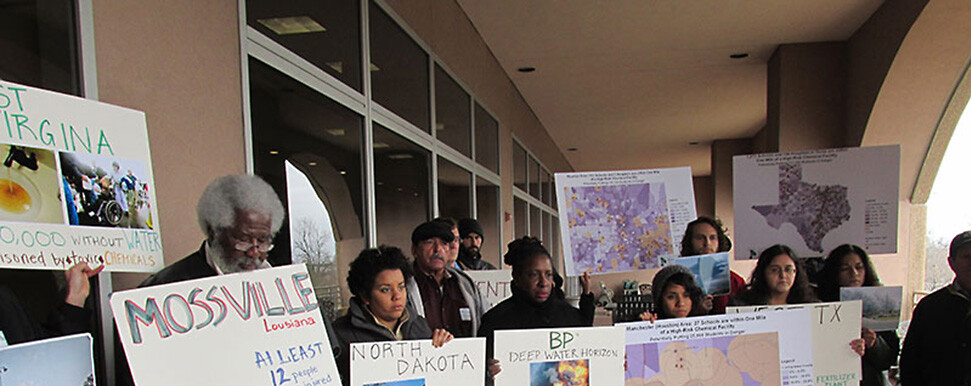
Media
November 13, 2013Are Toxic Chemical Disasters a National Threat? EPA, DHS, OSHA Hold Meeting to Hear from Experts On Threat From Chemicals
Contact: Stephenie Hendricks, (415) 258-9151, shendricks@comingcleaninc.org
November 15, 2013 Listening Sessions held in Washington, DC
Session: 8:00 a.m. - 4:30 p.m.
Location: General Services Administration ROB Auditorium, 301 7th Street SW (7th and D Streets, across from L'Enfant Plaza Metro station) Washington, DC
(Washington, DC) The Environmental Protection Agency (EPA) in partnership with the Department of Homeland Security (DHS) and the Department of Labor’s Occupation Safety & Health Administration (OSHA) is holding a "listening session" about the threat of chemical disaster and health hazards for communities living near chemical plants and routes where chemicals are transported, on Friday, November 15, 2013, 8:00 a.m. - 4:30 p.m. eastern in Washington, DC. The session is one of several prompted by the explosion in West, Texas, and other areas.
On August 1st, President Obama issued an executive order requiring three federal agencies to coordinate their activities to propose new policies that will significantly enhance the safety and security of thousands of chemical facilities across the U.S. The "listening sessions" are aimed at gathering information from those most impacted by chemical hazards. More than a dozen advocates for disaster prevention requirements plan to make comments at Friday’s hearing.
"People are sick and dying from a failed chemicals policy that allows preventable explosions and other kinds of chemical exposures. These happen disproportionately in communities of color. We need President Obama’s executive order to have strong, effective protections from chemical disasters for those the most harmed already,” says Michele Roberts from the Environmental Health and Justice Alliance for Chemical Policy Reform. Michele will be speaking at the listening session.
“As a Wilmington, Delaware, council member, a mother of four, and a businesswoman, I am concerned about the threat of chemical disasters here. Our Port in Wilmington is a vital center for the state and for those who live and work here. The tragedy that might occur from a chemical disaster from the many toxic chemicals stored and transported through this area is too horrifying to imagine. I welcome President Obama's Executive Order to find a solution urgently to protect Wilmington and all communities from chemical disasters," says Council Member Maria D. Cabrera, Wilmington, Delaware.
“Rick Hind, Legislative Director for Greenpeace, states, “The tragedy in West, Texas that claimed 15 lives was preventable as are the looming disasters in major U.S. cities that could inflict a thousand times more casualties. In particular, plants that store tons of poison gases such as chlorine can put whole populations at risk 20 miles downwind. Fortunately there are safer alternatives for virtually all of these gases. All that’s needed is for the Obama administration to adopt common sense requirements that ensure that safer alternatives are the norm rather than the exception.”
At the first “Listening Session” on November 5th in Texas City, Texas, government officials questioned chemical safety advocates about whether “voluntary” programs should be strengthened with new rules and guidance to ensure that the safer chemical processes that will eliminate potential disaster are used where ever feasible. Voluntary programs in the past have allowed decades of harm to human health and the environment until requirements were finally adopted. A well known example is the removal of lead from paint, gasoline, drinking water and food containers. Existing voluntary programs that rely on voluntary market incentives failed to prevent the West, Texas explosion and hundreds of other deadly accidents. EPA has unique legal authority enacted after the 1984 Bhopal disaster to issue new prevention requirements that will eliminate these hazards. In fact, such a policy will have broad public support as shown in a recent Lake Research poll which found that a majority (59%) including Republicans and Democrats support new requirements to use safer cost-effective chemicals or processes where ever they are available to prevent chemical disasters.
Others attending include: Retired Major General Randy Manner; Bob Bostock, security advisor to Governor Christine Todd Whitman (R-NJ); Libby Foley, Government Affiars Advocate with Environmental Working Group Government Affairs; Gerald Poje, founding member of the U.S. Chemical Safety Board; Anna Fendley, MPH, Health, Safety and Environment Department, United Steelworkers; Dave LeGrande, Safety and Health Director with Communications Workers Union; Lee Anderson, Senior Policy and Legislative Advocate with BlueGreen Alliance; Terry McGuire, Associate Washington Representative with Sierra Club; Jenny Levin, Federal Public Health Advocate with US PIRG; Wilmington, Delaware Council Member Maria D. Cabrera, Michele Roberts for the Environmental Justice and Health Alliance and others.
Since the explosion in West, Texas and the government shutdown, there have been several chemical accidents across the country that have caused injuries and deaths. Every day, more than 100 million people in the U.S. live and work in the shadow of chemical facilities that store tons of hazardous chemicals with the potential to kill or injure thousands of workers and community residents; 473 of these facilities each put more than 100,000 or more people at risk. Safer, cost-effective chemicals and processes are widely available, and hundreds of facilities have already switched, but only a fraction of the highest-risk facilities have voluntarily converted. New requirements are needed to ensure the safer processes are used wherever they are feasible.
More listening sessions for President Obama’s Executive Order 13650
February 17, 2014: Baton Rouge, LA
January 6, 2014: Sacramento, CA
Additional Resources
Coalition to Prevent Chemical Disasters
Coming Clean Workgroup for Environmental Justice
Available for Comment
Maria D. Cabrera; Council Member, Wilmington, DE. Contact Michele Roberts or Stephenie Hendricks for interviews with Councilwoman Cabrera.
Michele Roberts; Co-Coordinator, Environmental Justice Health Alliance for Chemical Policy Reform; (202) 704-7593, mroberts@comingcleaninc.org. Michele can discuss the disproportionate impacts from toxic chemicals on communities of color.
Rick Hind; Legislative Director, Greenpeace; (202) 319-2445, rick.hind@greenpeace.org. Rick is an expert on chemical policy and how weak regulations contributed to the tragedies in West, Texas and elsewhere in communities impacted by chemical disasters.
Sofia Plagakis; Policy Analyst, Center for Effective Government ; splagakis@foreffectivegov.org.
